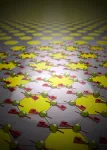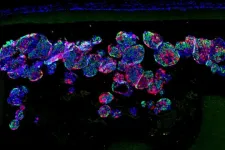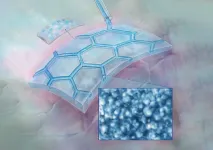(Press-News.org) Known as nature's own sonar system, echolocation occurs when an animal emits a sound that bounces off objects in the environment, returning echoes that provide information about the surrounding space.
While echolocation is well known in whale or bat species, previous research has also indicated that some blind people may use click-based echolocation to judge spaces and improve their navigation skills.
Equipped with this knowledge, a team of researchers, led by Dr Lore Thaler, of Durham University, UK, delved into the factors that determine how people learn this skill.
Over the course of a 10-week training programme, the team investigated how blindness and age affect learning of click-based echolocation. They also studied how learning of this skill affects the daily life of people who are blind.
The findings are published in the journal PLOS ONE.
The study involved blind and sighted participants between 21 and 79 years of age who trained over the course of 10 weeks. Blind participants also took part in a 3-month follow up survey assessing the effects of the training on their daily life.
Both sighted and blind people improved considerably on all measures, and in some cases performed comparatively to expert echolocators at the end of training. Somewhat surprisingly, in some cases sighted people even performed better than those who were blind.
Importantly, however, neither age nor blindness was a limiting factor in participants' rate of learning or in their ability to apply their echolocation skills to novel, untrained tasks. Furthermore, in the follow up survey, all participants who were blind reported improved mobility, and 83% reported better independence and wellbeing.
Overall, the results suggest that the ability to learn click-based echolocation is not strongly limited
by age or level of vision. This has positive implications for the rehabilitation of people with vision loss or in the early stages of progressive vision loss.
Currently, click-based echolocation is not taught as part of mobility training and rehabilitation for blind people. There is also the possibility that some people are reluctant to use click-based echolocation due to a perceived stigma around making the required clicks in social environments.
Despite this, the results indicate that blind people who use echolocation and people new to echolocation are confident to use it in social situations. The potential barriers relating to perceived stigma are perhaps much smaller than previously thought.
Dr. Lore Thaler, in the Department of Psychology at Durham University, said "I cannot think of any other work with blind participants that has had such enthusiastic feedback."
"People who took part in our study reported that the training in click-based echolocation had a positive effect on their mobility, independence and wellbeing, attesting that the improvements we observed in the lab transcended into positive life benefits outside the lab. "
"We are very excited about this and feel that it would make sense to provide information and training in click-based echolocation to people who may still have good functional vision, but who are expected to lose vision later in life because of progressive degenerative eye conditions."
The human brain continues to surprise us with its capabilities for complex learning strategies and the neuroplasticity to alter its very structure to better process information from its senses.
The work was funded by a grant of the Biotechnology and Biological Sciences Research Council United Kingdom, and a grant from the Network for Social Change.
INFORMATION:
MEDIA INFORMATION
Interviews
Dr Lore Thaler is available for interview on the 1st, 2nd and 3rd of June 2021 and can be reached at lore.thaler@durham.ac.uk
Alternatively, please contact Durham University Marketing and Communications Office on communications.team@durham.ac.uk
Source information
Human click-based echolocation: Effects of blindness and age, and real-life implications in a 10-week training program is published in PLOS ONE
Once the embargo of 6PM GMT (UK TIME)/2PM ET (USA TIME) WEDNESDAY 2 JUNE 2021 is lifted, the paper will be available at https://journals.plos.org/plosone/article?id=10.1371/journal.pone.0252330
Pictures available
Image(s) are available via this Dropbox link: https://www.dropbox.com/sh/90swrcvr01t3cxw/AAA1zFGnEiNU80yr6I_WegxPa?dl=0
Image credit - Canva stock footage
Useful web links
Dr. Lore Thaler's profile: https://www.dur.ac.uk/research/directory/staff/?mode=staff&id=9604
Department of Psychology, Durham University: https://www.durham.ac.uk/departments/academic/psychology/
About Durham University
Durham University is a globally outstanding centre of teaching and research based in historic Durham City in the UK.
We are a collegiate university committed to inspiring our people to do outstanding things at Durham and in the world.
We conduct boundary-breaking research that improves lives globally and we are ranked as a world top 100 university with an international reputation in research and education (QS World University Rankings 2021).
We are a member of the Russell Group of leading research-intensive UK universities and we are consistently ranked as a top 10 university in national league tables (Times and Sunday Times Good University Guide, Guardian University Guide and The Complete University Guide).
For more information about Durham University visit: http://www.durham.ac.uk/about/
END OF MEDIA RELEASE: Issued by Durham University Marketing and Communications Office - http://www.durham.ac.uk/news
Atomically thin van der Waals magnets are widely seen as the ultimately compact media for future magnetic data storage and fast data processing. Controlling the magnetic state of these materials in real-time, however, has proven difficult. But now, an international team of researchers led by Delft University of Technology (TU Delft) has managed to use light in order to change the anisotropy of a van der Waals antiferromagnet on demand, paving the way to new, extremely efficient means of data storage.
The thin atomic layers that make up van der Waals magnets may seem extremely fragile, but they can be about 200 times stronger ...
In a six-month study of more than 1,000 Americans, R. Kelly Garrett and Robert Bond found that U.S. conservatives were less able to distinguish truth from falsehoods in 20 viral political news stories that appeared online between January and July 2019. Differences in the political orientation of these stories may help explain this observation, the researchers note, writing that "we find that high-profile true political claims tend to promote issues and candidates favored by liberals, while falsehoods tend to be better for conservatives." Two-thirds (65%) of the high-profile true stories were characterized as benefiting the political left, compared with only 10% that were described as benefiting the political right. Among high-profile false stories, 45.8% were perceived to benefit the ...
Individuals at higher risk of developing pancreatic cancer could be identified earlier using machine learning (ML) techniques which would result in a greater number of patients surviving the disease, suggests a new study published in PLOS ONE.
The study was led by the London School of Hygiene & Tropical Medicine (LSHTM) and funded by the UK charity Pancreatic Cancer Research Fund (PCRF).
It used UK electronic health records for more than 1,000 patients aged 15-99 years who were diagnosed with pancreatic cancer between January 2005 and June 2009.
The researchers examined numerous symptoms and ...
A team of researchers led by diabetes specialists and biomedical engineers at Washington University School of Medicine in St. Louis and Cornell University has demonstrated that, using a miniscule device, they can implant insulin-secreting cells into diabetic mice. Once implanted, the cells secrete insulin in response to blood sugar, reversing diabetes without requiring drugs to suppress the immune system.
The findings are published June 2 in the journal Science Translational Medicine.
"We can take a person's skin or fat cells, make them into stem cells and then grow those stem cells into insulin-secreting cells," said Jeffrey R. Millman, PhD, an associate professor of medicine at Washington ...
A new study reveals that B cells can produce antibodies against the H1N1 influenza virus that also neutralize various other influenza strains, marking a development that could inform research into potential universal flu vaccines. The findings showed that the antibodies targeted two conserved regions of the virus - the cause of the 2009 swine flu pandemic - and that transfers of the antibodies protected mice from lethal infection. The work suggests that vaccines that target the two sites might be able to protect against a broader array of flu strains. Influenza is one of humanity's greatest microbial ...
RICHLAND, Wash.--Scientists have created a cybersecurity technology called Shadow Figment that is designed to lure hackers into an artificial world, then stop them from doing damage by feeding them illusory tidbits of success.
The aim is to sequester bad actors by captivating them with an attractive--but imaginary--world.
The technology is aimed at protecting physical targets--infrastructure such as buildings, the electric grid, water and sewage systems, and even pipelines. The technology was developed by scientists at the U.S. Department of Energy's Pacific Northwest National Laboratory.
The starting point for Shadow Figment is an oft-deployed technology called a honeypot--something attractive to lure an attacker, perhaps a desirable target with the appearance of easy access.
But ...
A new study from North Carolina State University found that certain types of messages could influence how people perceive information about the spread of diseases from wildlife to humans.
The researchers say the findings, published in the journal Frontiers in Communication, could help scientists, policymakers and others more effectively communicate with diverse audiences about zoonotic diseases and the role of wildlife management in preventing them from spreading to people. Zoonotic diseases are diseases that originate in wildlife and become infectious to people.
"If we want to prevent ...
A new global review has found that receiving Opioid Agonist Therapy (OAT) is associated with lower risk of multiple causes of death among people with opioid dependence.
The review found that people with opioid dependence were less likely to experience overdose-related, suicide, alcohol-related, cancer, and cardiovascular-related mortality while receiving OAT.
Researchers from the National Drug and Alcohol Research Centre (NDARC) at UNSW Sydney, University of Bristol and several other global institutions reviewed the relationship between OAT and mortality across type of drug, setting and participant groups from over 700,000 participants, which is six times the number of any other previous review.
The review found that mortality risk ...
Spiders avoid building webs near European fire ants, their natural predators, by sensing the chemicals they give off in the environment, Simon Fraser University researchers have found.
The findings, published recently in Royal Society Open Science, give us a peek inside the enduring struggle between spiders and ants, and could lead to the development of natural repellents for homeowners worried about unwanted eight-legged guests.
Many ants prey on spiders, suggesting that web-building spiders may avoid locations near ant colonies or frequented by foraging ...
The future of electronic displays will be thin, flexible and durable. One barrier to this, however, is that one of the most widely used transparent conductors for electronic displays--indium tin oxide (ITO)--doesn't perform as well on larger areas and can crack and break down with wear. Indium is also a rare earth mineral, which is relatively scarce, and the process to create ITO requires high energy consumption and expensive equipment.
One emerging alternative is metal "microgrid" conductors. These microgrids can be customized to their application by varying the microgrid width, pitch and thickness, and they can be made with a variety of metals.
New research from the University of Pittsburgh Swanson School of Engineering ...


